INTERNSHIP OPPORTUNITIES FOR INTERNATIONAL STUDENTS
Internship opportunities are essential for career development, particularly for students pursuing higher education abroad. For international students, internships offer more than just work experience—they are gateways to understanding professional culture, expanding networks, enhancing resumes, and improving chances of post-graduation employment in foreign countries. However, despite their importance, accessing these opportunities can be a daunting task for international students due to factors like visa restrictions, cultural barriers, competition, and lack of awareness.
This comprehensive write-up explores the types of internships available, strategies to secure them, challenges students face, top international internship programs, field-specific opportunities, and recommendations for maximizing the experience.
Understanding Internships for International Students
An internship is a short-term professional experience that allows students to gain exposure in their field of study or career interest. Internships can be paid or unpaid, part-time or full-time, and may be undertaken during academic semesters or summer breaks.
Types of Internships:
- On-campus internships – Roles offered within the university such as research assistants, lab technicians, or student ambassadors.
- Off-campus internships – These may be in private companies, non-profit organizations, or governmental bodies.
- Virtual internships – Remote opportunities that offer flexibility and global reach.
- Co-op programs – Long-term internships (usually 6–12 months) integrated with academic studies, often earning students academic credits.
- Summer internships – Short-term programs during summer breaks, typically 8–12 weeks in duration.
The Importance of Internships
Internships provide the following advantages:
- Practical Experience: Apply theoretical knowledge to real-world problems.
- Career Readiness: Develop soft skills like communication, teamwork, and problem-solving.
- Professional Network: Build relationships with industry professionals.
- Resume Enhancement: Increase employability with work experience.
- Job Offers: Many companies offer full-time jobs to successful interns.
- Cultural Adaptation: Learn workplace culture and etiquette in a new country.
Challenges Facing International Students
While the benefits are immense, international students face several challenges in securing internships.
1. Visa Restrictions
In many countries, international students are bound by visa regulations. For instance:
- USA: Students on F-1 visas must use Curricular Practical Training (CPT) or Optional Practical Training (OPT) to work legally.
- UK: Tier 4 visa holders can work only up to 20 hours during term time.
- Canada: International students require a study permit with a work condition to intern.
- Australia: Student visa holders can work up to 48 hours per fortnight.
These restrictions can deter employers from hiring international interns.
2. Sponsorship Concerns
Some companies prefer not to hire interns who may later require visa sponsorship. This narrows down the pool of potential employers.
3. Cultural Barriers
International students may struggle with workplace language, expectations, or communication styles. Additionally, resume and interview styles may differ from their home countries.
4. Lack of Networks
Local students often leverage personal connections to land internships. International students may lack access to these networks.
5. Financial Constraints
Unpaid internships may not be viable due to living expenses, especially in expensive cities. Furthermore, restrictions on work hours may limit earnings.
Strategies for Securing Internships
1. Early Preparation
Start searching and applying at least 4–6 months in advance. Prepare a strong resume and cover letter tailored to the country and role.
2. Use University Resources
Universities offer:
- Career counseling services
- Internship portals
- Resume reviews and mock interviews
- Career fairs
Use these platforms to your advantage.
3. Networking
Build relationships with professors, alumni, and industry professionals. Attend webinars, conferences, and networking events. Use platforms like LinkedIn to connect and request informational interviews.
4. Apply Broadly and Smartly
Apply to a wide range of roles, but ensure each application is personalized. Use platforms like:
- Indeed
- Internshala
- Handshake
- Glassdoor
- WayUp
- Idealist (for nonprofit roles)
5. Utilize Student Organizations
Join organizations like:
- AIESEC – Offers international internships with cultural exchange elements.
- IAESTE – STEM internship opportunities worldwide.
- Cultural Vistas – Provides U.S. internships for foreign students.
- IAESTE – Engineering and technical placements in over 80 countries.
6. Seek Faculty Help
Faculty members often have industry contacts and research projects that require assistance. Express your interest early.
Top Internship Opportunities and Programs for International Students
1. World Bank Internship Program (Summer and Winter)
- Open to students globally
- Paid internship
- Fields: Economics, finance, education, human development, and more
- Duration: 4 weeks to 3 months
2. UNICEF Internship Program
- For undergraduates, graduates, and Ph.D. candidates
- Provides stipend, travel support
- Global locations
3. Google STEP Internship
- For first or second-year undergraduate students
- Technical internship in software engineering
- Encourages applications from underrepresented groups, including international students
4. Microsoft University Internship Program
- For graduate and undergraduate students
- Paid internship across multiple departments
- Available worldwide
5. KAUST International Internship (Saudi Arabia)
- Fully funded 3–6 month internship
- Fields: Engineering, science, technology
- Covers airfare, visa, housing, stipend
6. OECD Internship Program (Paris)
- Graduate-level students
- Paid internship in economics, education, environment, trade
- Minimum duration: 1 month
7. IAESTE Internship
- Focuses on STEM internships
- Opportunities in 80+ countries
- Exchange-based program
Field-Specific Internship Opportunities
A. STEM Fields
- Research institutes, tech firms, pharmaceuticals
- Opportunities: Research assistant, developer intern, lab technician
- Platforms: ResearchGate, GitHub, Kaggle, STEMCareers
B. Business and Finance
- Investment banks, consulting firms, multinationals
- Opportunities: Analyst, marketing intern, accounting trainee
- Apply via: eFinancialCareers, Wall Street Oasis, CareerBuilder
C. Health and Medicine
- Hospitals, labs, public health NGOs
- Opportunities: Shadowing, public health intern, clinical research
- Check: WHO internships, CDC Global Health Internships
D. Arts and Humanities
- Museums, publishing houses, NGOs, embassies
- Opportunities: Communications intern, writer/editor, translator
- Search: Idealist.org, UN Careers, Cultural institutions
Internship Opportunities by Destination
1. USA
- Eligibility via CPT/OPT
- Popular Companies: Google, Facebook, Deloitte, Goldman Sachs
- Visa-friendly platforms: Interstride, GoinGlobal
2. Canada
- Work-integrated learning (WIL) model
- Co-op programs widely available
- Apply through Job Bank, TalentEgg, Workopolis
3. UK
- Internships via placement years or graduate schemes
- Work experience integrated into programs
- Popular websites: Milkround, Prospects.ac.uk, RateMyPlacement
4. Australia
- Part-time internships during study
- Post-study work rights available
- Sites: GradConnection, Seek, StudentEdge
5. Germany
- Known for engineering internships
- Students may work 120 full or 240 half days per year
- Apply via DAAD, ZAV, Jobbörse
Making the Most of the Internship
1. Be Professional
- Show up on time, dress appropriately, and follow workplace etiquette.
2. Communicate Clearly
- Ask questions, seek feedback, and keep your supervisor informed.
3. Network
- Attend company events, join project teams, and stay in touch after the internship.
4. Reflect and Document
- Keep a record of tasks, accomplishments, and skills gained.
5. Request a Reference Letter
- This can be invaluable when applying for future jobs or visas.
Internship Alternatives
If securing an internship is difficult, consider:
- Volunteering—NGOs often welcome international students.
- Remote Projects—Freelancing, consulting, or virtual internships.
- Research Assistantships—Join a professor’s research team.
- Entrepreneurship – Launch a small business or start a blog/project.
- Campus Jobs—While not always industry-specific, they teach transferable skills.
Recommendations for International Students
- Be Persistent – Don’t give up after a few rejections.
- Tailor Every Application—Personalize your resume and cover letter for each role.
- Practice Interviews—Familiarize yourself with common interview formats and questions.
- Stay Informed About Visa Rules – Work closely with your university’s international student office.
- Create an Online Portfolio—Showcase your work through a personal website or LinkedIn profile.
- Consider Time Zones—For virtual internships, coordinate effectively with global teams.
Conclusion
Internship opportunities are an invaluable part of the international student experience. They serve as a bridge between academic study and career development. Although challenges like visa limitations and lack of networks exist, numerous programs and strategies can help overcome them. By preparing early, networking smartly, leveraging university support, and applying to global programs, international students can unlock rewarding internship experiences that shape their future careers.
In a globalized job market, an international student equipped with internship experience becomes a strong contender in their industry. With resilience, adaptability, and strategic planning, success is well within reach.
![]()






